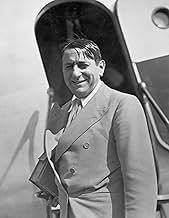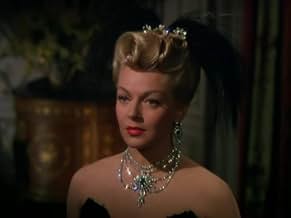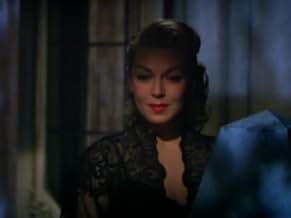IMDb RATING
5.7/10
704
YOUR RATING
Operating under royal orders, a count must woo a young and wealthy widow in order to save a kingdom from bankruptcy.Operating under royal orders, a count must woo a young and wealthy widow in order to save a kingdom from bankruptcy.Operating under royal orders, a count must woo a young and wealthy widow in order to save a kingdom from bankruptcy.
- Nominated for 2 Oscars
- 2 nominations total
Sujata Rubener
- Gypsy Girl
- (as Sujata)
Ludwig Stössel
- Major Domo
- (as Ludwig Stossel)
John Alban
- Club Patron
- (uncredited)
Erville Alderson
- Cart Driver
- (uncredited)
Bette Arlen
- Girl at Maxim's
- (uncredited)
Frank Arnold
- Waiter
- (uncredited)
Gertrude Astor
- Reception Guest
- (uncredited)
Featured reviews
Other than identifying the title character as an American now, The Merry Widow pretty much retains the same plot, even some of the same lines from the 1934 Jeanette MacDonald-Maurice Chevalier film.
Lana Turner is the widow of the man who was the richest person in the small kingdom of Mariskova. It's estimated in fact she has part ownership in 52% of the gross national product of the kingdom. She's the big fish in this pond.
Operating under the premise that Lana though she is now living in New York would still like to be a big fish in a small pond than be swallowed by an Austrian whale, King Thomas Gomez dispatches one of his playboy relations, Fernando Lamas too woo and wed the widow. The Hapsburgs are threatening that if they don't make good what's owed them they'll just come in and annex Mariskova. King Tom obviously does not want to spend his declining years in the fleshpots of Baden Baden or Marienbad or the French Riviera, he wants to stay king.
Getting the rich widow to underwrite the kingdom is not as silly a premise as it sounds. Just a bit before the action of The Merry Widow takes place, J. Pierpont Morgan literally underwrote the USA financial structure when asked to by President Cleveland.
Of course with a multi-millionaire fortune, Turner is naturally suspicious of a host of people trying to become friends and lovers.
The Franz Lehar songs which is what makes this operetta a beloved one by many repertoire companies are mostly present. Some are sung, others are relegated to the background. They are divided equally with the leading man and woman, here though Fernando Lamas carries the musical load. Trudy Erwin who dubbed Lana Turner's singing voice joins him briefly in the Merry Widow Waltz. All the other songs are given to Lamas including Vilia which is sung by the leading lady normally. Jeanette MacDonald sang it in the 1934 version and did it well.
Lamas and Turner were quite involved during this film. Esther Williams in her memoirs and this was years before she married Fernando tells that she was visiting the set at MGM one day and heard all kinds of squeals of passion coming from Turner's trailer. Obviously Fernando and Lana getting some rehearsal done.
Look for two nice supporting performances from Richard Haydn and John Abbott as a pair of bumbling Mariskovian diplomats and Una Merkel in her usual role as secretary and gal pal to Turner.
Even with technicolor this one doesn't quite measure to the 1934 version though Fernando Lamas does sing real nice.
Lana Turner is the widow of the man who was the richest person in the small kingdom of Mariskova. It's estimated in fact she has part ownership in 52% of the gross national product of the kingdom. She's the big fish in this pond.
Operating under the premise that Lana though she is now living in New York would still like to be a big fish in a small pond than be swallowed by an Austrian whale, King Thomas Gomez dispatches one of his playboy relations, Fernando Lamas too woo and wed the widow. The Hapsburgs are threatening that if they don't make good what's owed them they'll just come in and annex Mariskova. King Tom obviously does not want to spend his declining years in the fleshpots of Baden Baden or Marienbad or the French Riviera, he wants to stay king.
Getting the rich widow to underwrite the kingdom is not as silly a premise as it sounds. Just a bit before the action of The Merry Widow takes place, J. Pierpont Morgan literally underwrote the USA financial structure when asked to by President Cleveland.
Of course with a multi-millionaire fortune, Turner is naturally suspicious of a host of people trying to become friends and lovers.
The Franz Lehar songs which is what makes this operetta a beloved one by many repertoire companies are mostly present. Some are sung, others are relegated to the background. They are divided equally with the leading man and woman, here though Fernando Lamas carries the musical load. Trudy Erwin who dubbed Lana Turner's singing voice joins him briefly in the Merry Widow Waltz. All the other songs are given to Lamas including Vilia which is sung by the leading lady normally. Jeanette MacDonald sang it in the 1934 version and did it well.
Lamas and Turner were quite involved during this film. Esther Williams in her memoirs and this was years before she married Fernando tells that she was visiting the set at MGM one day and heard all kinds of squeals of passion coming from Turner's trailer. Obviously Fernando and Lana getting some rehearsal done.
Look for two nice supporting performances from Richard Haydn and John Abbott as a pair of bumbling Mariskovian diplomats and Una Merkel in her usual role as secretary and gal pal to Turner.
Even with technicolor this one doesn't quite measure to the 1934 version though Fernando Lamas does sing real nice.
This 1952 MGM production of Franz Lehar's classic pales in comparison with the Erns Lubitsch's lavish version, that even in black and white, is richer and more appealing to the eye than the later account.
Part of the blame must go to whoever decided to tailor make the film to suit its star, Lana Turner, and the direction of Curtis Bernhardt. As an operetta "The Merry Widow" has been delighting audiences for quite some time. The music alone is worth the price of admission, or in this case, the price of being able to get TCM on cable.
The other interesting thing is how the Technicolor used in the filming of this remake has faded after more than fifty years. The copy shown by TCM recently had a faded look that made it less interesting to watch.
Lana Turner and Fernando Lamas made an attractive couple, but their chemistry doesn't quite make it. Veterans Una Merkel, Thomas Gomez, Richard Haydn, and Marcel Dalio, among others, try their best, but their efforts don't make the film better.
We would strongly advise discerning viewers to check out the older Lubitsch's take on this timeless work.
Part of the blame must go to whoever decided to tailor make the film to suit its star, Lana Turner, and the direction of Curtis Bernhardt. As an operetta "The Merry Widow" has been delighting audiences for quite some time. The music alone is worth the price of admission, or in this case, the price of being able to get TCM on cable.
The other interesting thing is how the Technicolor used in the filming of this remake has faded after more than fifty years. The copy shown by TCM recently had a faded look that made it less interesting to watch.
Lana Turner and Fernando Lamas made an attractive couple, but their chemistry doesn't quite make it. Veterans Una Merkel, Thomas Gomez, Richard Haydn, and Marcel Dalio, among others, try their best, but their efforts don't make the film better.
We would strongly advise discerning viewers to check out the older Lubitsch's take on this timeless work.
The fictional nation of Marshovia is facing bankruptcy. So, to try to improve their finances, they invite a widow (Lana Turner) to their nation in order to give her deceased husband a statue...and try to marry her off to the handsome Count Danillo (Fernando Lamas). When she learns of the scheme, the widow is naturally angry and leaves Marshovia...and the Count soon follows her to Paris. Can the scheme STILL work in spite of all this?
The 1934 version of "The Merry Widow" was a marvelous old film for several important reasons. The Franz Lehár operetta (based on Henri Meilhac's play) was given the special Ernst Lubitsch touch and it happened to star one of the most charming actors of its day, Maurice Chevalier. But, when MGM wanted to remake the film in 1952, it lacked this same marvelous direction and starred the handsome but much blander Fernando Lamas. Apart from the nice Technicolor, it really is inferior to the earlier version...though it still is watchable and pleasant...but nothing more.
The 1934 version of "The Merry Widow" was a marvelous old film for several important reasons. The Franz Lehár operetta (based on Henri Meilhac's play) was given the special Ernst Lubitsch touch and it happened to star one of the most charming actors of its day, Maurice Chevalier. But, when MGM wanted to remake the film in 1952, it lacked this same marvelous direction and starred the handsome but much blander Fernando Lamas. Apart from the nice Technicolor, it really is inferior to the earlier version...though it still is watchable and pleasant...but nothing more.
The lovely Lana Turner stars in this rather lackluster Technicolor musical. In my opinion it is far inferior to the charming and hilarious 1934 Ernst Lubitsch version. (Both films are adaptations of an operetta, so the 1934 one isn't exactly the "original".)
To this film's credit, it's rather different from Lubitsch's version. It doesn't try to be an exact copy and can therefore be judged on its own merits. (I can't say which version of the story is most true to the original play.) This 1952 version is, for one thing, in color and features some new ballads to go with a couple familiar tunes from the earlier film. The songs, however, are largely forgettable. The storyline, about a small European kingdom sending a man to woo a wealthy widow, is a little different in this version, although the general arc is similar. (Viewers familiar with the 1934 version will notice the differences; I won't mention them here.)
This film overall did not impress me, partly because I'd been previously spoiled with the Lubitsch version, which is simultaneously a fairy tale romance and a hilarious comedy (with music, too!). This 1952 version is more of a second-tier MGM romance musical. It's really not a legitimate comedy, although it does try to be funny. But Lana Turner looks great in this good girl role (she'd played many a femme fatale) and the cast isn't bad. I can't fault the movie for trying, but it just falls a little flat for me.
THE MERRY WIDOW (1952) may be fun for musical junkies or viewers who don't know what they're missing, but I'd recommend the comedy of the 1934 version of the same story.
5.5/10
To this film's credit, it's rather different from Lubitsch's version. It doesn't try to be an exact copy and can therefore be judged on its own merits. (I can't say which version of the story is most true to the original play.) This 1952 version is, for one thing, in color and features some new ballads to go with a couple familiar tunes from the earlier film. The songs, however, are largely forgettable. The storyline, about a small European kingdom sending a man to woo a wealthy widow, is a little different in this version, although the general arc is similar. (Viewers familiar with the 1934 version will notice the differences; I won't mention them here.)
This film overall did not impress me, partly because I'd been previously spoiled with the Lubitsch version, which is simultaneously a fairy tale romance and a hilarious comedy (with music, too!). This 1952 version is more of a second-tier MGM romance musical. It's really not a legitimate comedy, although it does try to be funny. But Lana Turner looks great in this good girl role (she'd played many a femme fatale) and the cast isn't bad. I can't fault the movie for trying, but it just falls a little flat for me.
THE MERRY WIDOW (1952) may be fun for musical junkies or viewers who don't know what they're missing, but I'd recommend the comedy of the 1934 version of the same story.
5.5/10
Merry Widow, The (1952)
** (out of 4)
MGM's third attempt at the famous operetta by Franz Lehar probably has the biggest budget but it's lacking quite a bit from the much better 1925 and 1934 versions. This time out a wealthy widow (Lana Turner) is brought to a small country where the government there hopes she will spend her time and money. They hire the good looking Count Danilo (Fernando Lamas) to try and win her over. There's quite a bit to admire in this film but in the end it really left me bored, unattached and rather disappointed. It's very clear from the opening shot that MGM gave director Bernhardt a pretty big budget as the Technicolor really jumps off the screen as does the art direction and set design. Everything visually is striking here as the color really adds an entire dimension to the film and it really helps put you in this era and time. The sets are also quite lavish as we get some really amazing looking ballrooms and other settings that almost make this film worth watching. The costumes are another major plus as it really does seem like it took weeks just to place the extras in order so that the colors of their costumes would just bleed together and be perfectly captured by the cameras. If you just want some great looking eye candy then this film is a must see but the rest of the movie left me wanting a lot more. For starters, I found both Turner and Lamas to be very bland and boring in their roles and I didn't feel a single spark between them. I know Turner was going through some major issues at this point of her life so perhaps this took something away from her but I didn't find anything she did here to be very entertaining. Lamas certainly had the right look for the role but I never really cared for anything he was saying or doing. Una Merkel, a member of the 1934 version, has a few good moments here but not enough to save the film.
** (out of 4)
MGM's third attempt at the famous operetta by Franz Lehar probably has the biggest budget but it's lacking quite a bit from the much better 1925 and 1934 versions. This time out a wealthy widow (Lana Turner) is brought to a small country where the government there hopes she will spend her time and money. They hire the good looking Count Danilo (Fernando Lamas) to try and win her over. There's quite a bit to admire in this film but in the end it really left me bored, unattached and rather disappointed. It's very clear from the opening shot that MGM gave director Bernhardt a pretty big budget as the Technicolor really jumps off the screen as does the art direction and set design. Everything visually is striking here as the color really adds an entire dimension to the film and it really helps put you in this era and time. The sets are also quite lavish as we get some really amazing looking ballrooms and other settings that almost make this film worth watching. The costumes are another major plus as it really does seem like it took weeks just to place the extras in order so that the colors of their costumes would just bleed together and be perfectly captured by the cameras. If you just want some great looking eye candy then this film is a must see but the rest of the movie left me wanting a lot more. For starters, I found both Turner and Lamas to be very bland and boring in their roles and I didn't feel a single spark between them. I know Turner was going through some major issues at this point of her life so perhaps this took something away from her but I didn't find anything she did here to be very entertaining. Lamas certainly had the right look for the role but I never really cared for anything he was saying or doing. Una Merkel, a member of the 1934 version, has a few good moments here but not enough to save the film.
Did you know
- TriviaAfter Lana Turner's millionaire husband Bob Topping left her in 1951, she slashed her wrist and had to wear a bracelet during this shoot to cover the scar.
- GoofsThe statement about beginnings of decades and centuries, is absolutely not correct. :-)
- Quotes
King of Marshovia: I'm not asking you to fall in love with the woman. Marriage is quite enough.
- ConnectionsFeatured in Hollywood... Hollywood ! (1976)
- SoundtracksGirls, Girls, Girls
(uncredited)
Music by Franz Lehár
Lyrics by Paul Francis Webster
Sung by Fernando Lamas
- How long is The Merry Widow?Powered by Alexa
Details
Box office
- Gross US & Canada
- $4,865,760
- Gross worldwide
- $9,810,000
- Runtime
- 1h 45m(105 min)
- Aspect ratio
- 1.37 : 1
Contribute to this page
Suggest an edit or add missing content


























